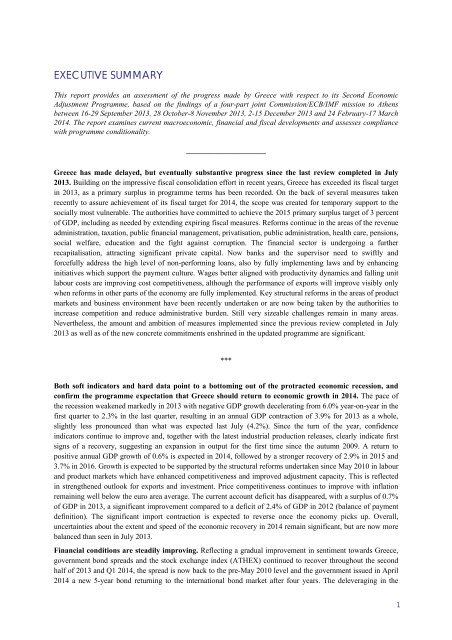ocp192_en
ocp192_en
ocp192_en
You also want an ePaper? Increase the reach of your titles
YUMPU automatically turns print PDFs into web optimized ePapers that Google loves.
EXECUTIVE SUMMARYThis report provides an assessm<strong>en</strong>t of the progress made by Greece with respect to its Second EconomicAdjustm<strong>en</strong>t Programme, based on the findings of a four-part joint Commission/ECB/IMF mission to Ath<strong>en</strong>sbetwe<strong>en</strong> 16-29 September 2013, 28 October-8 November 2013, 2-15 December 2013 and 24 February-17 March2014. The report examines curr<strong>en</strong>t macroeconomic, financial and fiscal developm<strong>en</strong>ts and assesses compliancewith programme conditionality._____________________EXECUTIVE SUMMARYGreece has made delayed, but ev<strong>en</strong>tually substantive progress since the last review completed in July2013. Building on the impressive fiscal consolidation effort in rec<strong>en</strong>t years, Greece has exceeded its fiscal targetin 2013, as a primary surplus in programme terms has be<strong>en</strong> recorded. On the back of several measures tak<strong>en</strong>rec<strong>en</strong>tly to assure achievem<strong>en</strong>t of its fiscal target for 2014, the scope was created for temporary support to thesocially most vulnerable. The authorities have committed to achieve the 2015 primary surplus target of 3 perc<strong>en</strong>tof GDP, including as needed by ext<strong>en</strong>ding expiring fiscal measures. Reforms continue in the areas of the rev<strong>en</strong>ueadministration, taxation, public financial managem<strong>en</strong>t, privatisation, public administration, health care, p<strong>en</strong>sions,social welfare, education and the fight against corruption. The financial sector is undergoing a furtherrecapitalisation, attracting significant private capital. Now banks and the supervisor need to swiftly andforcefully address the high level of non-performing loans, also by fully implem<strong>en</strong>ting laws and by <strong>en</strong>hancinginitiatives which support the paym<strong>en</strong>t culture. Wages better aligned with productivity dynamics and falling unitlabour costs are improving cost competitiv<strong>en</strong>ess, although the performance of exports will improve visibly onlywh<strong>en</strong> reforms in other parts of the economy are fully implem<strong>en</strong>ted. Key structural reforms in the areas of productmarkets and business <strong>en</strong>vironm<strong>en</strong>t have be<strong>en</strong> rec<strong>en</strong>tly undertak<strong>en</strong> or are now being tak<strong>en</strong> by the authorities toincrease competition and reduce administrative burd<strong>en</strong>. Still very sizeable chall<strong>en</strong>ges remain in many areas.Nevertheless, the amount and ambition of measures implem<strong>en</strong>ted since the previous review completed in July2013 as well as of the new concrete commitm<strong>en</strong>ts <strong>en</strong>shrined in the updated programme are significant.***Both soft indicators and hard data point to a bottoming out of the protracted economic recession, andconfirm the programme expectation that Greece should return to economic growth in 2014. The pace ofthe recession weak<strong>en</strong>ed markedly in 2013 with negative GDP growth decelerating from 6.0% year-on-year in thefirst quarter to 2.3% in the last quarter, resulting in an annual GDP contraction of 3.9% for 2013 as a whole,slightly less pronounced than what was expected last July (4.2%). Since the turn of the year, confid<strong>en</strong>ceindicators continue to improve and, together with the latest industrial production releases, clearly indicate firstsigns of a recovery, suggesting an expansion in output for the first time since the autumn 2009. A return topositive annual GDP growth of 0.6% is expected in 2014, followed by a stronger recovery of 2.9% in 2015 and3.7% in 2016. Growth is expected to be supported by the structural reforms undertak<strong>en</strong> since May 2010 in labourand product markets which have <strong>en</strong>hanced competitiv<strong>en</strong>ess and improved adjustm<strong>en</strong>t capacity. This is reflectedin str<strong>en</strong>gth<strong>en</strong>ed outlook for exports and investm<strong>en</strong>t. Price competitiv<strong>en</strong>ess continues to improve with inflationremaining well below the euro area average. The curr<strong>en</strong>t account deficit has disappeared, with a surplus of 0.7%of GDP in 2013, a significant improvem<strong>en</strong>t compared to a deficit of 2.4% of GDP in 2012 (balance of paym<strong>en</strong>tdefinition). The significant import contraction is expected to reverse once the economy picks up. Overall,uncertainties about the ext<strong>en</strong>t and speed of the economic recovery in 2014 remain significant, but are now morebalanced than se<strong>en</strong> in July 2013.Financial conditions are steadily improving. Reflecting a gradual improvem<strong>en</strong>t in s<strong>en</strong>tim<strong>en</strong>t towards Greece,governm<strong>en</strong>t bond spreads and the stock exchange index (ATHEX) continued to recover throughout the secondhalf of 2013 and Q1 2014, the spread is now back to the pre-May 2010 level and the governm<strong>en</strong>t issued in April2014 a new 5-year bond returning to the international bond market after four years. The deleveraging in the1


